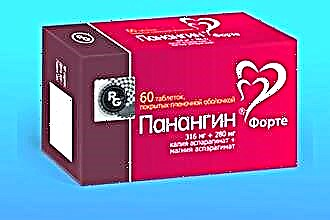Inflammatory myocardial diseases account for 3-5% of all cardiac pathology, and a fifth of non-ischemic lesions. The widespread occurrence of myocarditis is due to a decrease in the body's resistance to viral and bacterial infections, the use of cardiotoxic drugs. The clinical picture of the disease is polymorphic and is characterized by the absence of specific symptoms. The peculiarity of the pathology causes intensive therapy in the acute period, which is carried out in order to avoid the consequences.
Physiological and morphological substrate of inflammatory changes in the myocardium
The tissue structure of the heart is represented by three main membranes:
- external (pericardium, "heart bag");
- middle muscle (myocardium);
- internal (endocardium, which is represented mainly by the valve apparatus).
The muscle fibers of the middle layer differ from the skeletal muscles by the presence of connections, which ensures the contraction of the whole heart during impulse conduction. The blood supply to the cells is carried out by the coronary vessels, which are the pathways for the penetration of inflammatory agents (viruses, bacterial toxins).
Inflammation of the heart muscle caused by a viral infection develops as a result of the penetration of RNA (or DNA) into the fiber with the further multiplication of pathogens. The accumulation of antigenic particles in the cell disrupts metabolic processes, changes the architectonics of the tissue, and also leads to a disorder in the coordination of the contractile function of the heart.
On the other hand, the immune response to agent penetration can also cause myocardial damage due to the influence of cytokines and cross-reacting antibodies. This mechanism leads to impaired contractile function and remodeling of the heart chambers.
The cross-reaction mechanism is that the antigenic structure of viral or bacterial particles mimics the structure of cardiomyocytes. Therefore, the action of antibodies is directed both to bacteria and to its own tissue.
Pathologies that cause inflammation of the heart muscle
The development of myocarditis is most often the result of generalized pathology or diffuse toxic effects of chemicals.
The most common diseases that cause inflammation of the heart are:
- bacterial pathologies: scarlet fever, meningococcal infection, Q fever, chlamydia, diphtheria, streptococcal sore throat, Lyme disease, typhoid fever;
- invasion of protozoa: trypanosome, toxoplasma, malaria plasmodium;
- viral pathologies: Coxsackie, influenza, herpes, cytomegalovirus, arbovirus, coronavirus. Rubella virus during pregnancy causes myocarditis in the mother and heart abnormalities in the newborn;
- fungal infections: aspergillosis, cryptococcosis, histoplasmosis;
- parasitic pathologies: brucellosis, trichenellosis;
- deficiency states: lack of phosphorus, magnesium, calcium;
- systemic connective tissue pathologies (scleroderma), thyroiditis;
- allergic reactions after using serums and vaccines, insect and reptile bites;
- taking medicines: antibiotics (penicillin, tetracycline), antidepressants, paracetamol, anti-tuberculosis drugs.
Alcohol, cocaine, compounds of arsenic, lead, carbon monoxide, as well as prolonged exposure to high temperatures and ionizing radiation have a cardiotoxic effect.
Algorithm for the treatment of inflammatory myocardial dysfunctions
Conservative treatments for heart muscle inflammation include medication and general guidelines.
The latter include strict bed rest for a month, which is prescribed to prevent the development of complications. A diet with sufficient amounts of micronutrients (Calcium, Magnesium, Phosphorus) and limiting the intake of salt and water is recommended.
The appointment of pharmacological drugs depends on the severity of the pathology, as well as on the existing symptoms of inflammation of the heart muscle.
Etiotropic therapy with antibiotics, antiprotozoal or antiviral agents is prescribed after laboratory confirmation of the underlying cause of myocarditis.
Non-specific therapy involves the use of:
- non-steroidal anti-inflammatory drugs (NSAIDs): Nimesulide (100 mg 2 times a day), Meloxicam (15 mg a day);
- enzyme preparations - Wobenzym (5-10 tablets 3 times a day);
- antiarrhythmic drugs (with palpitations, interruptions in work): Bisoprolol, Carvedilol;
- metabolic agents that improve metabolic processes in the myocardium: Mildroonat (250 mg 3 times a day), Trimetazidine (20 mg 3 times a day);
- inhibitors of antiotensin-converting enzyme (ACE inhibitors) - for the prevention of heart remodeling: Captopril, Lisinopril.
- diuretics (diuretics) when signs of heart failure and stagnation appear: Veroshpiron, Furosemide.
- anticoagulants - for the prevention of thromboembolic complications: Warfarin.
In the case of a pronounced inflammatory process, the attending physician decides on the appointment of glucocorticoid and immunosuppressive drugs.
Conclusions
The development of inflammatory processes in the myocardium is a frequent complication of infectious processes or pathologies associated with the synthesis of immune complexes. The clinical picture of the disease is accompanied by fatigue, high fever and dull pain in the region of the heart. Confirmation of the diagnosis is carried out by recording an electrocardiogram and laboratory tests. An early start of adequate therapy promotes complete recovery and prevents the chronization of the process.



